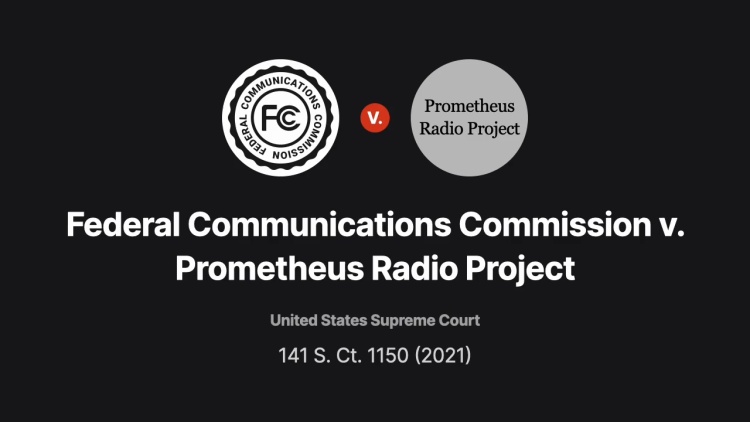Federal Communications Commission v. Prometheus Radio Project
United States Supreme Court
141 S. Ct. 1150, 209 L. Ed. 2D 287 (2021)
- Written by Tanya Munson, JD
Facts
The Federal Communications Commission (FCC) (plaintiff) had authority to regulate broadcast media in the public interest. The FCC’s authority included promulgating ownership rules to limit the number of television stations, radio stations, and newspapers that a single company could own in a market. The Telecommunications Act of 1996 directed the FCC to review such ownership rules every four years and to repeal or modify any regulation it determined to no longer be in the public interest. In 2016, the FCC concluded that the ownership rules remained necessary to promote the FCC’s public-interest goals of promoting competition and a diversity of viewpoints in local markets. In 2017, the FCC analyzed record evidence of dramatic changes in the media market over the last several decades. Based on the analysis, the FCC repealed two ownership rules and modified a third (the rule changes) after determining that the rules were no longer necessary to promote competition, localism, or viewpoint diversity. The FCC considered statistics, empirical studies, predictive data, market trends, and public comments to determine that the rule changes were unlikely to harm minority and female ownership. Prometheus Radio Project (Prometheus) (plaintiff) petitioned for review, arguing that the FCC’s decision to make the rule changes was arbitrary and capricious under the Administrative Procedure Act (APA). Prometheus asserted that the FCC ignored studies submitted by the media-reform group Free Press that showed past relaxations of ownership rules led to decreases in minority- and female-ownership levels. Prometheus also argued that the FCC’s datasets were incomplete. The FCC responded by claiming that it considered the Free Press studies and interpreted the studies and datasets to show a long-term increase in minority ownership after ownership rules were relaxed. The FCC acknowledged gaps in the data but claimed it had requested additional data and never received any. The Third Circuit Court of Appeals found in favor of Prometheus, holding that the record was insufficient to support the FCC’s determination that the rule changes would have minimal effect on women and minority owners. The FCC appealed, and the Supreme Court granted certiorari.
Rule of Law
Issue
Holding and Reasoning (Kavanaugh, J.)
What to do next…
Here's why 907,000 law students have relied on our case briefs:
- Written by law professors and practitioners, not other law students. 47,100 briefs, keyed to 996 casebooks. Top-notch customer support.
- The right amount of information, includes the facts, issues, rule of law, holding and reasoning, and any concurrences and dissents.
- Access in your classes, works on your mobile and tablet. Massive library of related video lessons and high quality multiple-choice questions.
- Easy to use, uniform format for every case brief. Written in plain English, not in legalese. Our briefs summarize and simplify; they don’t just repeat the court’s language.





